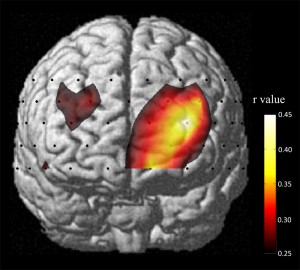Subjective QOL and the brain Association between subjective QOL and prefrontal activation measured by near-infrared spectroscopy

Recently, there has been growing emphasis on enhancing subjective quality of life (QOL), in addition to treating symptoms of disease or old age or extending one’s life. However, the neurobiological basis of subjective QOL is unknown.

© Yoshihiro Satomura, Kiyoto Kasai. Cerebral mapping illustrating a significant positive correlation between subjective QOL and brain activation during a verbal fluency task.
Department of Neuropsychiatry, Graduate School of Medicine, the University of Tokyo explored the association between prefrontal function and subjective QOL in 72 healthy volunteers, using 52-channel near-infrared spectroscopy (NIRS), a portable neuroimaging device that can measure brain function in a less-constrained condition. More specifically, NIRS was used to measure prefrontal hemodynamic response (blood flow) while subjects were asked to match words that started with a particular letter in a given period of time, a verbal fluency task. Verbal fluency tasks serve as a measure of an individual’s language processing and producing ability. Results con?rmed that subjective QOL was positively correlated with prefrontal hemodynamic response during a verbal fluency task and that subjective satisfaction regarding social relationships and in the physical domains were cardinal contributors to the association.
These ?ndings suggest that subjective QOL has possible involvement in prefrontal function and that NIRS potentially plays a role as a biological marker of subjective QOL.
Paper
Yoshihiro Satomura, Ryu Takizawa, Shinsuke Koike, Shingo Kawasaki, Akihide Kinoshita, Eisuke Sakakibara, Yukika Nishimura, and Kiyoto Kasai,
“Potential biomarker of subjective quality of life: Prefrontal activation measurement by near-infrared spectroscopy”,
Social Neuroscience Online Edition: 03 Dec 2013, doi: 10.1080/17470919.2013.861359.
Article link
Links
Graduate School of Medicine and Faculty of Medicine
Department of Neuropsychiatry, Graduate School of Medicine
Cognitive Psychobiology Research Group, Department of Neuropsychiatry, Graduate School of Medicine (Japanese)
Strategic Research Program for Brain Sciences, MEXT (Japanese)






